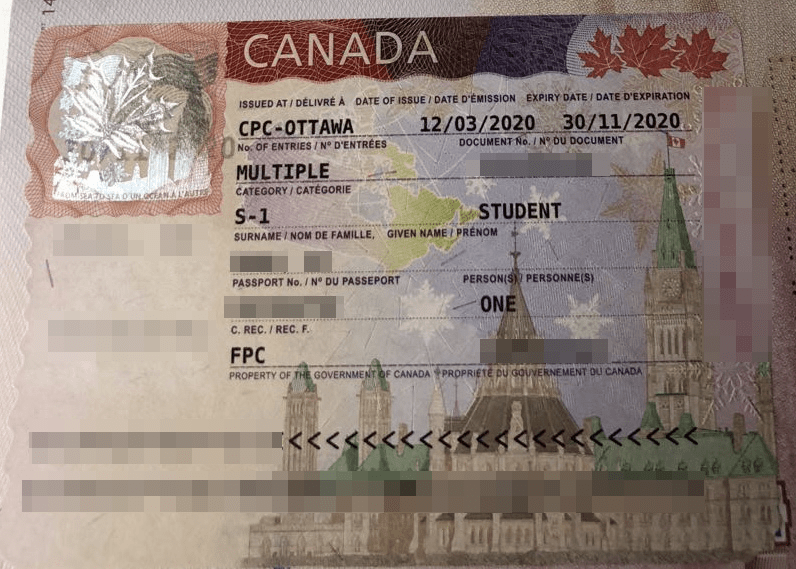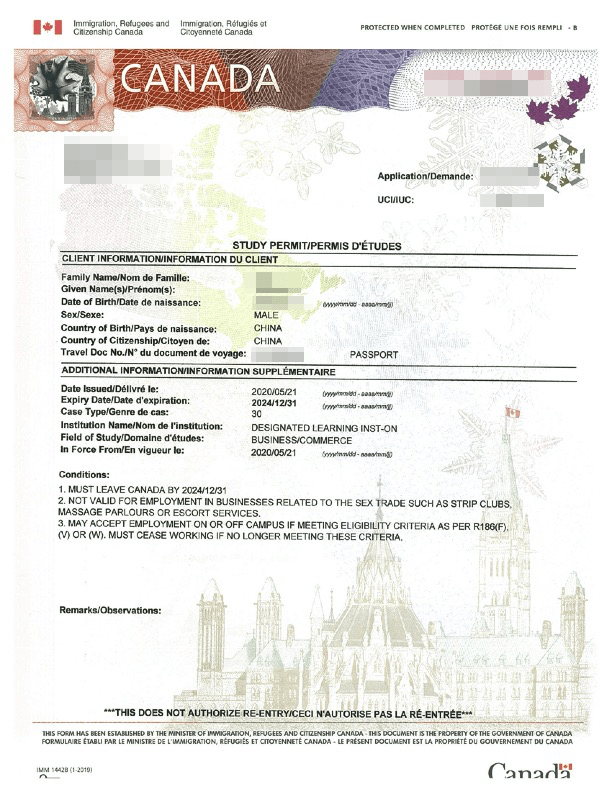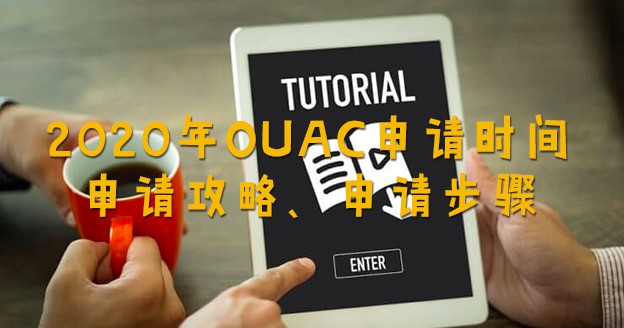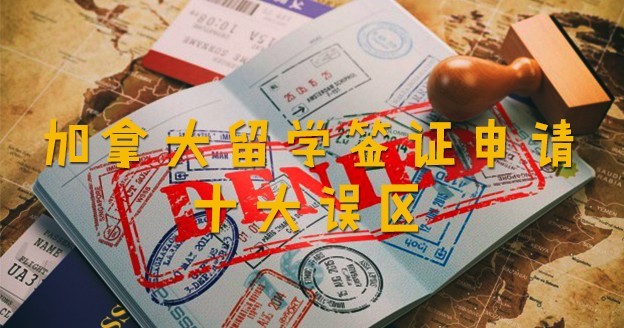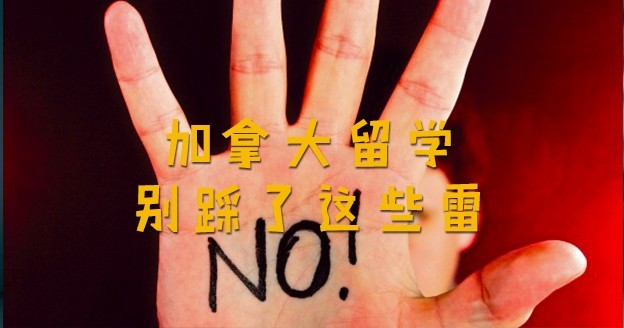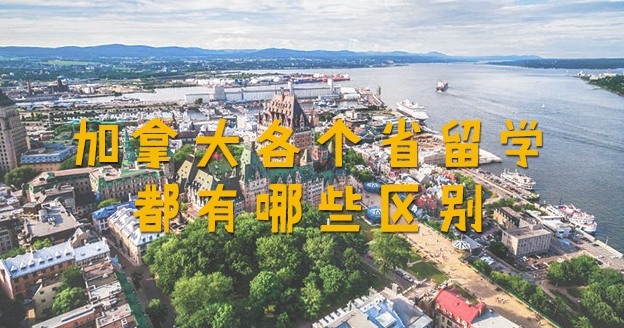你是不是听过很多“黑中介”坑人导致签证被拒?你是不是觉得留学本身就是一种锻炼,签证申请最好就是DIY?你是觉得中介收费太贵,想要省下这笔钱?那你找对地方了。最贴心的非SDS留学签证申请攻略,没有之一。我的目标是让你,“一文在手,申请不愁”。
如果申请签证中遇到问题,或因材料等原因拒签,保持冷静避免惊慌,但也要慎重对待;尤其是自身学习状况存在问题时,尤其需要谨慎。可以尽快与我们contact us,我们的留学规划师与移民顾问将为你提供最专业的咨询与办理服务。
What is a Canadian student visa?
Whether you are a college, university, orstudents applying for graduate school in Canada, after you overcome all kinds of difficulties to get an admission offer from a Canadian university/college, you must now overcome a major obstacle, that is, toapply for a Canadian study visa.。
TheStudent Visais a kind ofEntry Visa, commonly known as the "small visa". It determines whether you can legally enter Canada through Canadian customs. It is issued by the Canadian Embassy in China.
Another extremely important document is theCanadian Study Permit, or the “big visa”. The customs officer will issue it to you when you first enter through Canadian Customs. At the same time you receive the student visa, you will also receive anIntroduction Letter of Study Permit.With this letter and your University offer letter, you can get a study permit at the place of entry (Canada Customs). The validity of the student visa determines how long you can live in Canada. Customs officers generally decide on the validity of your visa based on your expected graduation date.
加拿大大使馆会收加元100加币作为“小签”申请费(折合人民币500-600元),生物采集费 85加币(折合人民币450-500元)
In addition, agencies in China charge about ¥10,000-30,000 for the individual’s first application of a student visa. If you find an independent agent or a small agency to handle your application, the service fee will be lower. If you go through a large study abroad agency, the cost will naturally be higher.
According tothe Canadian Embassy’s latest student visa application policy in 2018策,, Canadian student visa types available to Chinese students have been changed from the original 6 types to the current four categories:
| Student Direct Stream (SDS) |
|
| Post-secondary School Pla |
|
| Primary and Secondary School Plan |
|
| the General Category |
|
What we are referring to here is the last item, the general study plan. It can be said that the main reason people apply through this method is because they are unable or unwilling to do the following:无法做到或不愿意做到以下几点:
- 雅思成绩未达到5.5分或者6分(且单项6分)
- From a a bank designated by the Canadian Embassy, purchase aGuaranteed Investment Certificate (GIC)(GIC)
The application for the student visa should be submitted after the offer of admission is received and the medical examination results are obtained, but the application materials should generally be prepared 6-10 months in advance. When having to take the IELTS test, many people start preparing even two years before going abroad. The ideal timeline is:
- January - September of the first year: Prepare for IELTS. If there is not enough money in your bank account, you can start saving up at this time.
- October - December of the first year: Get your IELTS results, apply to a school.
- January – March of the second year: Receive an offer of admission. Submit a student visa application.
- 第2年 3月份:生物采集
- April - August of the second year: If your visa application is denied, the embassy will send you a rejection letter. The letter will clearly list the reasons for your rejection (such as "insufficient funds," "immigrant intent," etc.). Therefore, during this time, you can take remedial measures one by one according to the reasons for your rejection.
- September of the second year: Admission
There are two ways to apply for a general visa to study abroad: paper and electronic. Before you start preparing your application materials, you need to decide which application method to use, because the documents required are different.
- For the electronic/online application, you cansubmit your study permit application materials online through the CIC official website.I have not personally applied through the electronic application, but I have seen many people online saying that it is more suitable for applicants in Canada.
- To submit a paper application, students can submit application materials and pay the application fee to the Canadian Visa Application Centre. (Here is theofficial website of the Canadian Visa Application Centre.)。
Since this article is mainly written to benefit the applicants in China, the following instructions are based on the paper application.
Many people who have applied for Canadian visas from different countries have complained that the CIC official website is confusing and not user-friendly. To this end, I professionally made many screenshots in this article and attached a download link.
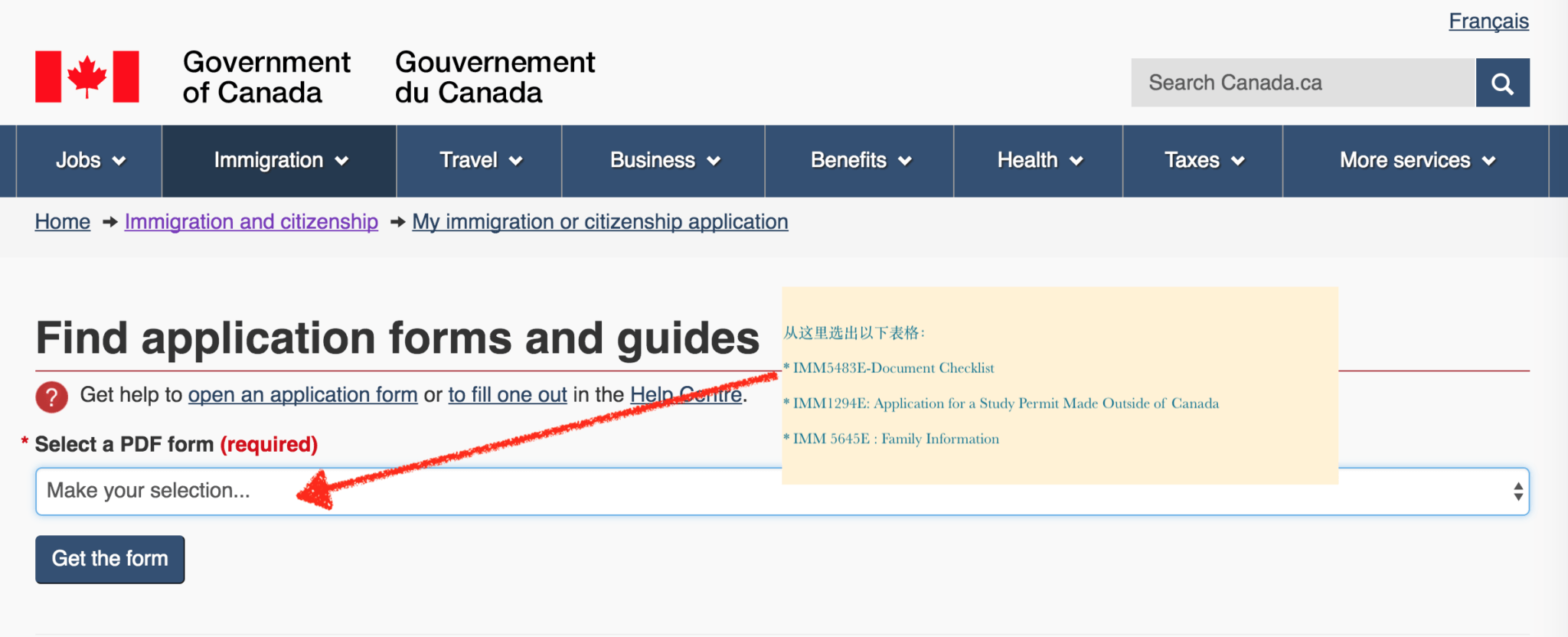
For other forms, click on the link in the article to download them.
Simply put, there are two key things to remember about the application materials:
1) You must have sufficient funds to support your life and tuition in Canada: We mentioned earlier the approximate cost of studying in Canada. Generally speaking, the amount you need to prepare in the bank should theoretically be enough to cover all your expenses studying abroad for several years.
2) You must not have any intention of immigration; Whether your real plans after graduation is to apply for immigration to Canada or to return to your home country, in your application documents, you should still state that you intend to leave Canada after graduation.
With these two cores, you can't go wrong in the your direction of preparing your application. The following is a list of required materials.
The form downloaded from the CIC website:
- IMM5483E: Document Checklist [click to download] According to the requirements on the official website, this form also needs to be filled out and submitted. However, many people do not have the IMM5483E form when they submit their applications to the visa centre in person. If you are mailing your application, it is recommended that you attach this form.
- IMM1294E: Application for a Study Permit Made Outside of Canada Honestly answer each question and fill it out accordingly. It should be noted that completing the form, you need to click ”Validate" below the form a barcode is generated on the last page. The barcode page needs to be printed out and submitted together.
- IMM 5645E: Family Information Form This form contains basic information about the applicant ’s parents.
- Details of Education/Employment [click to download]申请人的教育就业细节表 ] The applicant's education and employment details are written in this form, the applicant needs to fill in their education background, work experience and all travel in the past five years Chinese/English (or Chinese/French).
- Family Composition and Details of Education / Employment The form contains fields about the applicant’s parents’ education background, work experience and information on their siblingsclick to download】
Other documents:
- Admission Offer:Assuming that you have successfully obtained the admission letter from the university of your choice in accordance with the "second step". The notice must indicate the exact amount of tuition to be paid the applicant, the expected start and end date of duration of study, and the registration deadline. The exact tuition fee was not stated in my offer letter. So I found the tuition information from the official website, printed it and submitted it with my application.
- Study Plan:The study plan mainly describes your purpose and plan for studying in Canada. It is one of the key things to a successful student visa application, and it is also one of the items for immigration officers to examine to find out whether you have the intention of immigrating. The key to writing a study plan is to convince immigration as to why you will not stay in Canada after graduation. There are many writing templates online that anyone can refer to. Remember, the points you must mention are: a) Why study to Canada in your chosen institution and program; b.) Overall education goals; c.) How a Canadian degree can increase your employment opportunities. The above three points are mentioned on the official website. According to the information on the Internet, we usually add a fourth point, which is the reason why the applicant decides to return to China after graduation: “it is simply that my parents need me to return and take care of them, and studying here will bring me good employment opportunities after returning to my home country.”
- roof of funds -- applicants need to have a proof of funds issued from their primary bank.The safest way is to keep your funds in your bank account for 6-8 months. The specific amount depends on the applicant's education tuition and whether they have a scholarship. The official website describes the proof of funds certification as follows,
- Proof of Funds Description 1 - Proof that reflects at least 12 months of fund accumulation history. This is mainly to prove to the visa officer that the money you have is yours and not borrowed temporarily for visa application. At that time, my parents had deposited the money into a bank account one year in advance, so the bank statement can show 12 months of funding history. The funds and the account were under my parents’ names.
- Proof of Funds Description 2 - Written description of the source of funds.Using your parents’ tone in writing, indicate the source of the money (such as salary, bonuses, etc.), and “I have prepared this money for my child to study abroad. I am willing to provide financial support for my child to study abroad, and this decision will not impact my own life.” There are many templates like this on the Internet for reference. Just write it out and let your parents sign it. Note here that the source of funds must be reasonable!
- The applicant’s parents’ notarization of their proof of employment certificates requires the following:
- Notarization of their income tax payment slips
- If they are married, submit a copy of the marriage certificate and its translation.
- Medical Examination Certificate: Get a medical exam at a hospital designated by the Canadian Embassy. This medical examination is to protect the health of the Canadian public from infectious diseases being brought to Canada. Also, it is to reduce the burden that international students place on the Canadian healthcare system.
- Applicant’s passport photocopy of the first and last page(signature page)
- Two photographs of the applicant following the required specifications. The name and date of birth of the applicant must be written on the back of the photo. Link to detailed visa photo specifications,Temporary Resident Visa application photograph specifications
- Copy of the applicant's Chinese national ID card
- If a medical examination has been completed, submit acopy of the form provided by the designated physician.。
- Notarized copies of high school diplomas and transcripts. Go to your high school for to request for diplomas and transcripts, and then proceed to the notary office for notarization.
- Photocopy of the applicant's household registration booklet and a notarized copy.
- Notarization of academic certificates, degree certificates, and transcripts (if your transcript is already in Chinese and English, you do not need a notarization). Note, the notarization referred to here requires an English translation. In general, English translation services are available at all notary offices. So, you must first request these documents from the school(s) you graduated from, and then go to the notary office for notarization.
- Notarized copy of criminal background check. This needs to be obtained from the local police station, and it takes 2-4 weeks to be issued. After getting the background check certificate, go to the notary office for notarization.
The two most common reasons for refusal are "immigrant intent " and "insufficient funds."
So, as we mentioned earlier,there are two key thingsto remember about preparing your application. You must take them into careful consideration. Here are a few tips to prove you do not have any "immigrant intent":
- Consider the rationality of your study plan. "Furthering your studies" is a logical approach. For example, after graduating from a high school or college China, you are going to Canada to study for an undergraduate degree; or you have completed your undergraduate in China and you are going to Canada to study for a graduate degree; or maybe you already have a graduate degree and you are applying for a foreign doctorate. If you are an undergraduate, try to avoid applying for college.
- According to the visa application data published by the Canadian Embassy in the past year and along with our professional experience, the higher the degree you study, the greater the chances of getting a visa. Canada welcomes highly educated talents with open arms;
- Secondly, the degree applied for should match your age as closely as possible, otherwise it will be difficult to convince the visa officer;
- There is actually a limit on the number of visas to be issued by the embassy to students who start school in September. This phenomenon can be confirmed from the history of visa issuances over the years. The applications that are submitted close to September are more likely to be refused because of tight quotas. So apply as soon as possible and prepare in advance!
Since many people are stuck at the proof-of-funds stage, we will focus in on this step and explain it in the next section.
As mentioned above, the proof of funds is a crucial part of your application.
A variety of documents can be used for proving funds.Bank statements, real estate ownership certificates, stocks, and company equity certificates can all be used as support for the proof of funds. What you need to make sure is that these documents are in both Chinese and English.
However, here is the tricky part, most of these documentsare easily attainable by most people, so the most important piece is your bank statement. After all, cash is the most liquid form of funds. In response to this crucial document, the following are the requirements for bank statements:
- 存款的数额:需要保证金通常是: (学费 + 生活费)* 学年。举个例子,如果你来加拿大读本科,并假设学费1.5万加币/年、生活费1万加币/年、那么你每年的留学费用就是2.5万加币(按照2020汇率算,为13万人民币左右)。期限4年,则保证金为 10万加币(折合1人民币为50-60万左右)。所以说,具体存多少钱,看的是具体的学校专业和留学的城市。
- The statement period must meet the official requirements of the visa application centre, that is, in addition to the proof of funds history of at least 12 months, the applicant also needs a written explanation of the source of the fund. Therefore, many people prepare 12 months in advance and save some money every month (so, it appears more convincing to have salary payments deposited in the account directly.)
- When getting a bank statement, it is generally required to freeze the account, in many cases, for three months, but if conditions permit, it is best to keep it untouched for six months.
- The content of the bank statement must be in Chinese and English. Fortunately, most banks can now directly issue statements in Chinese and English. If your bank does not, try to request it by explaining that you are using it as a proof of funds for studying abroad, which requires both Chinese and English.
- How long to freeze your funds: 3-6 months before the student visa application
Gather the completed application form, checklist and consent form, together with your passport, two photos and all necessary application materials, plus visa application fees, service fees and courier return fees (see step 4 for fee details), proof of payment. Put the documents in a sealed envelope and mail it to the Canadian Visa Application Centre at the address below. (Note: If your return address is different from the address on the service agreement or the recipient is not the applicant, you must attach an explanation letter.)
签证中心
地址
北京 中国北京市东城区东直门南大街11号中汇广场A座12层邮编:100007
上海 中国上海市黄浦区四川中路213号久事商务大厦2层 邮编:200023
沈阳 中国辽宁省沈阳市沈河区北站路61号财富中心A座4层 邮编:110013
济南 中国山东省济南市历下区文化西路15-1号千佛山大厦(济南签证中心)8楼 邮编:250011
武汉 中国湖北省武汉市江汉区建设大道518号招银大厦13楼1301 邮编:430022
南京 中国江苏省南京市建邺区河西大街190号 北京银行大楼7层 邮编:210019
杭州 中国浙江省杭州市滨江区科技馆街626号寰宇商务中心B座801室 邮编:310051
广州 中国广州市天河区体育西路189号城建大厦3楼351室, 邮编:510620
重庆 中国重庆市渝中区民生路235号海航保利国际中心33楼33-D, 邮编:400010
成都 中国四川省成都市锦江区东御街19号茂业天地A座36层3602-3603室 邮编:610016
昆明 中国云南省昆明市盘龙区世博路12号低碳中心A座1501C 邮编:650000
签证递交上去之后,24小时内CIC的账户里会收到生物采集信,需要提前预约时间,前往签证中心 进行生物采集,可通过签证中心网站在线预约,电话预约,邮件预约等方式提前进行预约。需确保根据预约时间提前15分钟到达签证中心。
生物采集完成之后,加拿大签证中心官方上称,留学签证审理周期为8周。其实,在签证淡季,确实可能只需要一两个月。
However, the processing period can be extended if the following situations occur: the applicant requires a medical examination/re-examination, investigation from the embassy, supporting documents, embassy interview (rare), etc. In this case, the process may be delayed for another two months.
In order to avoid this situation, students and parents must 1) apply early; 2) complete the medical examination and prepare all materials fully.

